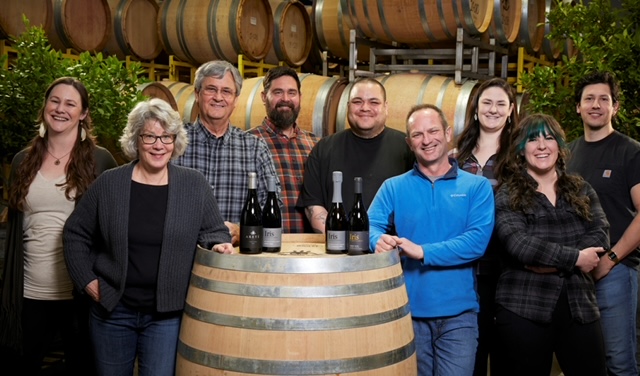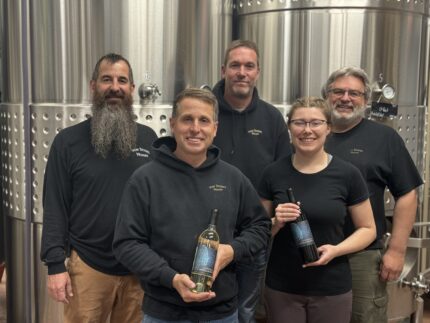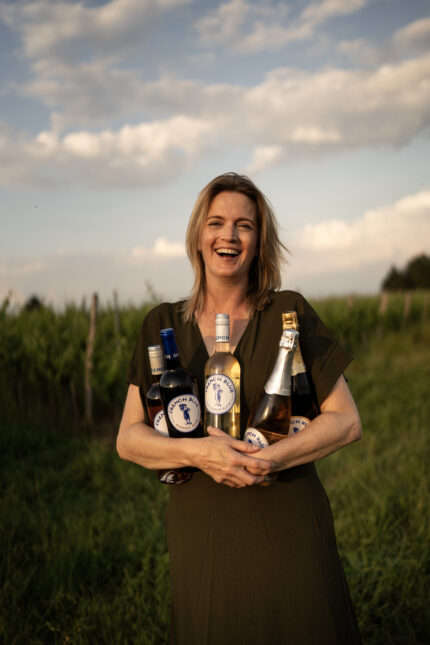Areté, it’s a state of mind with deep roots in Greek mythology. It has a meaning of fulfilling one’s potential and continually striving to be better. At Iris Vineyards, it is a mantra that translates to vineyard practices, preserving the land, the quality of wine, people, and hospitality – basically from vine to wine.
The History of Iris Vineyards
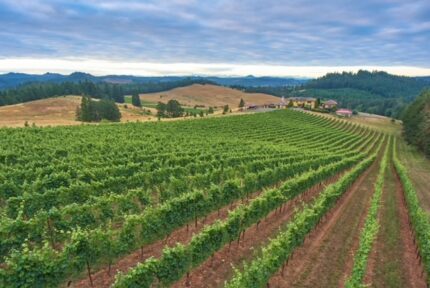
This family-owned winery was named after the irises that cover the hills at the southern edge of the vineyard. The 870-acre, high-elevation vineyard has 37 acres planted – 9 for pinot gris, 2 for chardonnay, and the rest for pinot noir. The boutique winery makes wines from its own grapes in the Chalice Vineyard, a cool-climate vineyard, and sourced from other high-quality vineyards.
Iris Vineyards distributes 8 wines with a production of 20,000 with an end goal of 30,000. They currently make Pinot Noir and Pinot Gris and added sparkling wines in 2015.
The People
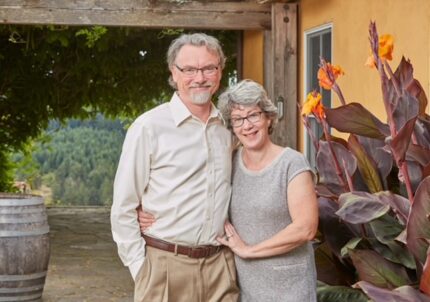
It started with Proprietors Richard Boyles and Pamela Frye who after working in Europe focusing on international business and hospitality, returned to Eugene, and decided to spend several years searching for the perfect property that could grow world-class Pinot Noir like the styles they found in Burgundy, Alsace and Germany.
In 1992, they found a plot of land at the south end of the Willamette Valley. It has been debated that the north side grows better wine, and they were determined to prove that theory wrong. There was even an economic feasibility study that highlighted the risk of farming wine grapes in the Willamette Valley. In the spirit of Areté, they planted vines in 1996 and built a small house on the property (now the Tasting Room) for themselves and their children. That turned into the tasting room, and they would move their personal furniture from their living room out when tasters were present.
They replanted 500 acres of the estate with Douglas Fir and Ponderosa Pine for timber harvesting and committed to restoring a diverse forest habitat. This helps Oregon white oak trees from being overgrown by big-leaf maple and fir trees. When wood is harvested, it is selected and quickly replanted. The 200+ acres of open meadows and pastureland are leased for grazing purposes.

Winemaker Aaron Lieberman was hired to create wines that truly honor their source. In the beginning, Aaron attended Oregon State University where he was first pursuing a career as a veterinarian. He realized that he had a strong interest in soils (Oregon State didn’t have a viticulture program at the time) and changed his major to Crop and Social Science. He had the chance to work on research projects with a passionate team of educators and graduate students as a member of the Soil Judging Team. During this time, several of the professors and graduate students in Aaron’s department had been volunteers for the Peace Corps. Aaron spent Fall of 1993 to the Summer of 1996 volunteering for the Peace Corps in Guatemala.
He returned to Oregon in 1996 and began his wine career. He worked in the vineyard at Amity Vineyards, as a harvest intern at De Ponte Cellars where he escalated his passion for Old World wine, as a vineyard foreman at Durant Vineyards, and then assistant winemaker for Owen Roe. He joined Iris Vineyards as the winemaker in 2001 because he also shared a passion for quality and sustainability. Aaron is also a member of the Oregon Wine Board and the Willamette Valley Wineries Association Board of Directors.
Iris Vineyards has become a top producer of Pinot Noir and Pinot Gris. Aaron added sparkling to the mix in 2015. He wanted to prove Iris Vineyards could make great sparkling. So, he and his father made a sparkling from Iris Vineyards estate grapes to prove it could be done. Richard and Pamela later tried it and bought all his inventory. Since then, the program has been expanded to a rosé, a blanc de blanc, a blanc de noirs, and a blend.
Aaron believes that sustainable farming practices are essential for producing high-quality wines that are good for the environment. “The best wines are made from the best grapes grown in a climate and soils appropriate to the varietal. Wines made from these grapes are more true to the varietal and expression of where they are grown, he said. “I know I needed to make wines like this to help change the perception of wine quality in the Southern Willamette Valley.”
Sustainability
Iris Vineyards uses sustainable practices to grow its grapes, and the winery also uses light weight, domestically produced bottles and cartones to reduce its environmental impact. After an episode of cork contamination in 2008, the winery shifted to higher-end screw tops for 90 percent of its wines. He told me, “At the time, I only had one worker and we had to uncork and check every bottle.”
The Wines
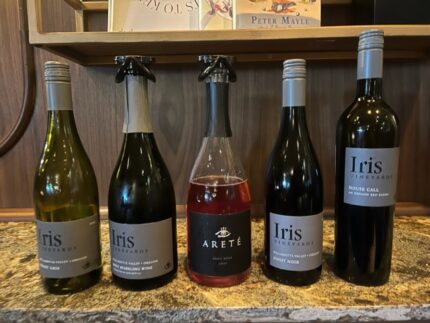
- 2019 Iris Vineyards Pinot Gris – a very nice expression of Pinot Gris with notes of honeydew, nectarine, chalk, apple, and a nice minerality. The 2022 is the latest vintage, but since the winery entered the Texas market right at the time of the pandemic, there is an older vintage for sale in our market. It is proof that Pinot Gris can age and still be fresh.
- NV Iris Vineyards Brut Sparkling Wine – this was lovely with notes of croissant, stone fruit, hazelnut, apple, and citrus.
- 2019 Areté Brut Rosé — This sparkling comes from the winery’s estate vineyard and is fermented in French oak. The color is stunning with notes of raspberry, strawberries, pomegranate, and spice. The Areté label is used for sparkling and reserve wines.
- 2021 Iris Vineyards Pinot Noir – notes of raspberry, plum, pomegranate, earth, plums, and spice.
- 2020 Iris Vineyards House Call – this is the only wine not sourced from the Willamette Valley and reflects the blending expertise that Aaron learned at Owen Roe as well as the good relationships with growers and managers he met as a vineyard manager. The name is a tribute to Aaron’s grandfather who was the last doctor to do house calls in Willamette Valley. It is a blend of cabernet franc, merlot, malbec, and cabernet sauvignon. I tasted raspberry, cedar, herbs, and cherry.
And since May is Oregon wine month, I thought it was fitting to profile a winery that uses Areté as a mantra to strive to make things better and to elevate the profile of Southern Willamette Valley, Oregon wines.
